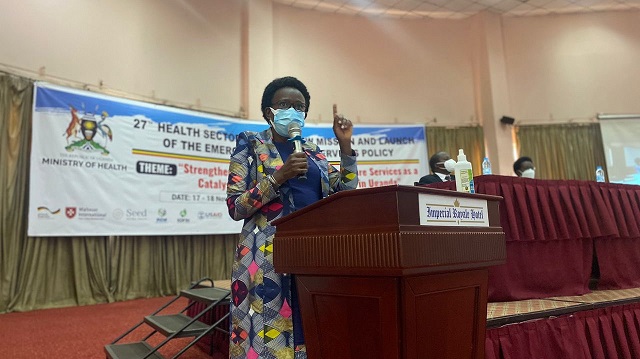
Kampala, Uganda | THE INDEPENDENT | The Ministry of Health has launched the National Emergency Medical Services Policy.
The policy supposed to streamline emergency response services in the country, aims at reducing avoidable mortality, morbidity and disability, by ensuring all people in need of emergency care access it. The policy will also provide safe and quick transportation of the sick to hospitals.
Dr John Baptist Wanyiaye, the commissioner in charge of emergency services at the health ministry says the policy will organise the medical emergency services in the country, and remove instances where ambulances just move aimlessly with out any direction.
“The policy will stop the occurrence of ambulances going to health facilities yet there are no beds. We saw this during the COVID-19 second wave when ambulances from around the country would go and lineup at Mulago yet there were no beds to accommodate more patients. This endangers the lives of patients,” he said.
In addition to this, the policy also sets standards for transporting causalities. At the moment, Uganda has more Type A ambulances that are considered transport vehicles that cannot offer any medical care to injured persons. Health minister Dr Jane Ruth Aceng says that under the policy, such ambulances will no longer be used in the country to transport the sick.
According to Wanyiaye, it will take 20-years to fully implement the policy, which will also see at least five regional trauma centres constructed. So far, one has been set up at Naguru General Hospital.
In addition to this, a total of 460 ambulances will be purchased to ensure that each constituency has one ambulance. A call and dispatch number will also be set up. At the moment, the number 912 is being considered.
“The system that we have now doesn’t function well. It’s not efficient. Many avoidable deaths occur due to this. This policy will make sure that everyone in the country can access health care when they need. We are going to set up regional centers at our already existing regional referral hospitals to ensure that all the regions are covered with the same quality of care,” he said.
According to the health ministry, 608 billion Shillings will be needed to implement the policy fully. So far, 30 billion Shillings was mobilized during the COVID-19 pandemic and used to procure over 40 Type B and C ambulances.
*****
URN
 The Independent Uganda: You get the Truth we Pay the Price
The Independent Uganda: You get the Truth we Pay the Price


